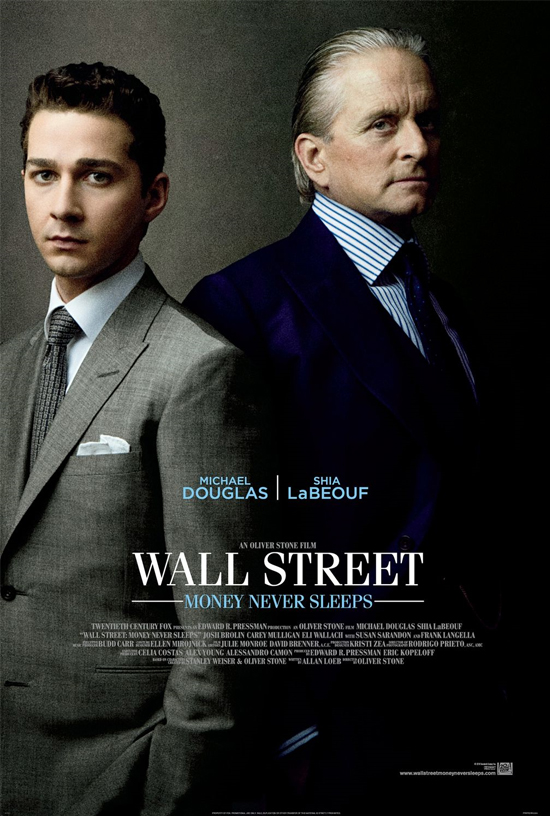 Last weekend I saw the movie, “Wall Street: Greed Never Sleeps.”
Last weekend I saw the movie, “Wall Street: Greed Never Sleeps.”
I suppose this could have been a moment for the great director, Oliver Stone, to make a poignant statement about the excesses of greed that have littered the last two decades – it’s pernicious role in the global financial meltdown of 2008, and the negative impact it has created on society as a whole. Yes, it could have been a moment where we all take a collective deep breath, bow our heads in shame, call it for what it was, and vow to never, ever allow that careening behavior to set its foot in our society again. We will be a better people, a better country, and the feds will really crack down this time, you just wait!
But, unfortunately, the movie sucked. It was uneven, klunky and contrived. And whose idea was the hip 80’s retro David Byrne soundtrack? It didn’t work. At all. I pictured Oliver Stone at the screening, drilling his fingers into his thighs, repeating to himself over and over, “What was I thinking?”
Or maybe that was me.
But, dear reader, you did not come here today for a bad movie review, did you? No, but I needed a segue to talk about greed, and the movie was it. Remember the hero, Gordon Gekko’s famous statement from the original Wall Street movie? He brazenly proclaimed to his protegé, Bud Fox, “Greed is good.”
Well, he sure got his in the end. Or so we thought. In spite of his jail time and the appearance of a repentant heart after his release, by the time the sequel movie ends, Gordon is right back into empire-building mode. It’s just something he has to do. Almost, but not quite, at the cost of his family, which at the last-minute he swoops in to make good on (remember what I said about the movie being contrived?).
So why does this insatiable desire for money drive these people to such excessive behavior?
I, for one, am not ashamed to admit that I am ambitious. But for me, money has always been about its practical use more than anything else. Let’s face it: money sure does come in handy sometimes. It pays for our homes, puts food on the table, and clothes on our backs. It also pays for our church staff, important missions and service work, too. Money can do a lot of good, and there’s an incredible need for it.
But if you flip the coin, there is another side. It’s no secret that the desire for money can lead to plenty of selfish, unethical and downright sleazy behavior. Look no further than the headlines that continue to dominate the media over the past couple of years: extravagant bonuses, Ponzi schemes, Wall Street greed – a vast ethical vacuum lies in the wake of the financial markets that have crumbled before us. Most of the hard-working, honest folk have had enough of this, and stand ready with pitchforks and torches in hand, waiting for nightfall, upon whence they shall descend upon the next unsuspecting AIG executive that emerges from his Lower Manhattan lair. The cry rises up from the angry mob: “Dang-it, we’re gonna learn him a lesson he never got in his fancy MBA school!”
Well, maybe money is not the problem; per se. Currency is simply an objective tool to help us make more efficient and functional transactions in our society, right? So why, then, has money had such a nasty effect on peoples’ thinking throughout history, driving them to do such stupid things?
A recently published article in New Scientist magazine, called “Why Money Messes With Your Mind,” asks this same question, but from a neuropsychological angle. The article reviews a slew of research that looks at the effect of money on your brain. And, guess what? It turns out that money really does mess with our thinking, to the point that it may indeed cause us to do something totally wacky.
Here are some of the findings:
- Simply thinking about words associated with money can make us more self-reliant and less inclined to help others.
- The very act of handling cash can diminish physical pain and social rejection.
- Money affects some brains the same way drugs affect addicts.
- Subjects who heard words associated with commerce were slower to ask for help
Hmm. Why does this all sound so familiar? Oh yes, I remember. I think I once read about something like this in an ancient manuscript which is called, THE BIBLE?
Jesus knew all about this problem 2,000 years ago when he gave that famous talk about the camel going through the eye of a needle. It is harder for a rich man to get into heaven, he said (followed immediately, by the way, with “But with God, all things are possible!”). And Paul wrote one of the most misquoted scripture verses of all time in I Timothy 6:10, which says,
“The love of money is a root of all kinds of evil. Some people, eager for money, have wandered from the faith and pierced themselves with all kinds of grief.”
Well said, St. Paul. All throughout the New Testament are references to the dangers of the love of money, not money itself. They might as well have written similar verses about the love of food, or sex, or the insatiable desire to see a new comment posted on your Blog every five minutes. Our brains have this needy little hot spot baked right in there that is constantly screaming at us from the sidelines, like a screeching monkey. “No, don’t stop! We need more! Hey Loser, Over here! More of that! I’m not filled yet! You are such a stupid Loser! Gimme some of that! We need more! More! More!”
I think the screeching monkey is the root of all evil. Not the money.











